 |
Sally Hayns, CEO of the Chartered Institute of Ecology and Environmental Management (CIEEM) |
As the professional body for ecologists and environmental managers in the UK, CIEEM is delighted to see the development of the GCSE in Natural History. It marks and important step on the journey to developing (or reinforcing) a connection with nature that will hopefully, for some young people at least, lead to consideration of a career in ecology and environmental management.

We know that the biodiversity crisis and climate emergency are going to require unprecedented levels of political commitment and policy ambition if we are to safeguard our environment for current and future generations. But we are also going to need a growing army of people to work in careers that directly benefit nature’s recovery and deliver nature-based solutions to the impacts of a changing climate. We are also going to need more people doing jobs in ways that are environmentally sustainable rather than environmentally damaging. In future that army of people may well have been influenced in their career choice by their experience of undertaking a GCSE in Natural History. What an inspiring thought!
I am fortunate to sit on the Government’s Green Jobs Delivery Group and I chair Defra’s Nature Skills Working Group so I see first hand the political concern regarding the need to make sure we are recruiting people into these essential careers. But concrete action to pave the way of the career journey is down to organisations like CIEEM together with educators, employers and careers advisers. It is exciting to see the degree of collaboration and energy currently going into planning and adapting accessible routes into these jobs that will build on the GCSE in Natural History – new T-levels in England, new apprenticeships, HNDs, updated degree programmes and microcredentials, for example, all geared to helping young people transition post-GCSE into a role that interests them.
But, according to research we undertook in 2021, one of the biggest barriers to accessing a nature-focused career is, quite simply, a lack of awareness of the range of roles available and/or poor perceptions about what they actually entail (you don’t always get cold, wet and muddy!). To towards the end of last year we launched a new website, Green Jobs for Nature, which aims simply to get the message out to 13 – 20 year-olds that there are lots of exciting nature-focused careers out there to suit most interests and abilities, ranging from an ecologist through to environmental educators, policy makers, countryside rangers, data mappers, forestry workers, marine scientists and lots more. We have over 90 real-life job profiles so users can read about what it is actually like to do the job.
Importantly the website explains the different types of employer offering these types of jobs and offers advice on how to get them, including the different education and training routes available. Finally, it signposts towards other organisations and sources of information and support that can help people on their journey to finding a career that suits them.
But another issue that we have to tackle is the appalling lack of diversity in the environmental employment sector. Since 2017 when the Policy Exchange published its damning report on this issue there has been much hand-wringing and sector introspection but I am really pleased to say that this has turned into a concerted campaign of action to bring about change. We need people from all backgrounds and communities to apply their talents to tackling the twin environmental crises and we need to create inclusive work experiences and opportunities. Many environmental organisations and employers are working with stakeholder organisations to take a collaborative approach to tackling this issue. Within CIEEM we have appointed an E,D and I Engagement Officer, we are reviewing our own performance in this area and we are launching a specific diversity and inclusivity thread of our Green Jobs for Nature campaign to make sure we reach currently under-represented audiences.
So, going back to my first point, the new GCSE Natural History will, I believe, prove to be a crucial step in building that understanding (and indeed passion) for the natural world that will lead to a lifelong interest in nature and, for some students at least, lead onto a stimulating and worthwhile career. It is beholden on stakeholders such as ourselves to make those career journeys accessible and those jobs attainable. We cannot afford to fail.
Sally Hayns
Sally has been an ecologist for more than 30 years, working primarily in the eNGO and public sectors. She joined the (then) Institute of Ecology and Environmental Management as CEO in 2010 and has been instrumental in driving forward change within the Institute and the profession. Under her stewardship the Institute gained its Royal Charter in 2013 and introduced a Competency Framework for the profession, which now forms the basis for membership and chartered ecologist grades and assessment, reinvigorated the Institute’s policy and influencing work, and consistently promotes the ecology and environmental management profession as a key player in action to address the environmental challenges we face.
Sally also leads the Institute’s work on green skills, chairing Defra’s Nature Skills Working Group and sitting on the UK Government’s Green Jobs Delivery Group.
Keep up to date with our proposed GCSE in Natural History and other Cambridge OCR Natural History news by signing up our email newsletter and updates. You can read back issues of our Natural History newsletter here.

